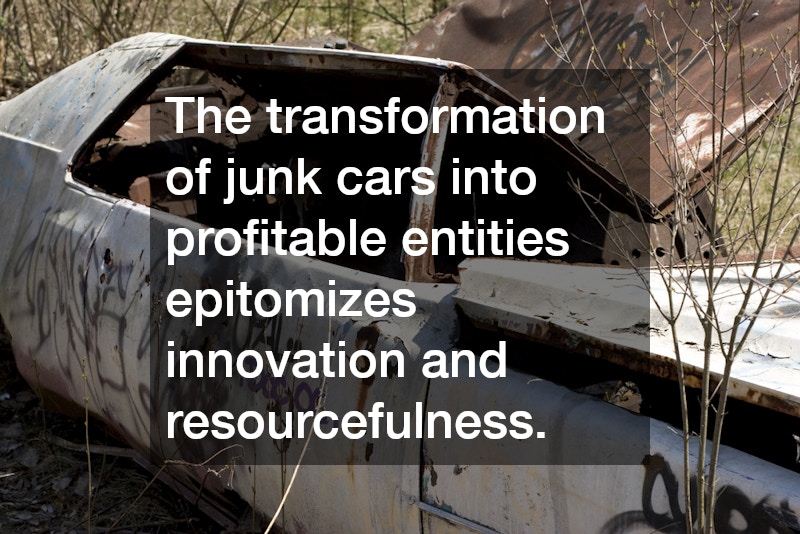In the fast-evolving auto industry, innovation and strategy are paramount when it comes to maximizing revenue streams. One often overlooked opportunity lies in transforming junk cars into profitable ventures. As auto industry professionals look for ways to increase profitability, understanding the potential of junk cars can provide a lucrative edge. This article explores the best practices in extracting value from vehicles that would otherwise sit idle, rusting away and depleting resources.
Understanding the Market Value of Junk Cars
Junk cars typically refer to vehicles that are no longer usable, often with significant damage or mechanical issues. While these vehicles are past their prime, they hold hidden value that savvy professionals can exploit. By recognizing the component parts that retain value, auto industry professionals can dismantle junk cars and sell individual parts. This process requires careful analysis of market trends to identify which parts are in demand.
Market demand for certain car parts fluctuates based on vehicle popularity and part scarcity. Auto professionals need to stay current with industry trends to capitalize on the best opportunities. Essential components, such as catalytic converters, airbags, and engines, often hold significant value. Properly identifying and extracting these parts can significantly boost profits from junk cars. Additionally, advertising these parts through online marketplaces can expand reach to a broader customer base.
Furthermore, before dismantling any junk vehicle, it’s crucial to assess the costs associated with storage and labor. Efficient management of these factors can enhance profit margins considerably. Developing relationships with local junkyards or recycling centers can also streamline operations and reduce costs. By understanding the nuances of the market value of junk cars, professionals can make informed decisions that maximize returns.
Implementing Effective Recycling Techniques
Recycling is not only an environmentally responsible practice but also a profitable one when it comes to junk cars. One of the best practices is to collaborate with recycling companies that specialize in processing automotive scrap. These companies possess the necessary infrastructure to safely and efficiently recycle metals and other materials. By forming partnerships with reputable recyclers, auto professionals can ensure they receive competitive prices for scrap materials.
A well-executed recycling strategy involves categorizing materials based on their composition and market demand. Metals, plastics, and other reusable materials should be separated at the initial stage of dismantling to maximize efficiency. Understanding the composition of junk cars allows professionals to make educated decisions on how to process each part. For instance, steel and aluminum typically yield higher profits due to their high demand in the manufacturing sector.
Moreover, adopting sustainable practices not only elevates profit margins but also enhances a company’s reputation. Businesses that emphasize eco-friendly initiatives tend to attract more customers willing to support environmental causes. Therefore, implementing effective recycling techniques in handling junk cars is a crucial step towards establishing a successful, ethical, and profitable business model. This approach is mutually beneficial, serving both the industry and the environment.
Leveraging Digital Platforms for Sales
The rise of digital technology has opened new avenues for selling parts from junk cars. By utilizing online platforms, auto professionals can reach a global audience with minimal investment. Websites like eBay, Craigslist, and specialty auto parts sites are excellent venues for listing parts with detailed descriptions and photographs. To stand out in a crowded market, it is essential to provide clear, high-quality content that highlights the value of the products.
Building a strong online presence requires more than just listing products. Professionals should engage with potential customers through social media and forums, addressing inquiries and offering expertise. Customer service plays a vital role in developing trust and fostering repeat business. Additionally, seeking feedback through online reviews helps refine processes and adapt to customer needs. By leveraging digital platforms, auto industry professionals can effectively turn junk cars into a sustainable revenue stream.
Furthermore, using digital analytics tools can offer insights into buyer behavior, allowing for strategic adjustments. Trends in search keywords and customer preferences can guide marketing efforts and inventory decisions. By staying informed and adaptable, professionals can capitalize on emerging opportunities and optimize their approach. Digital platforms are thus a critical component in transforming junk cars from a burden into a lucrative business opportunity.
As technology continues to evolve and environmental concerns rise, the importance of sustainable practices will only increase. Auto industry professionals who stay ahead of these trends stand to benefit financially and ethically. By adopting and refining these best practices, professionals can not only enhance their profitability but also play a pivotal role in shaping a more sustainable future for the industry.
In the world of auto industry professionals, the transformation of junk cars into profitable entities epitomizes innovation and resourcefulness. The path to success lies in integrating best practices at every stage of the process. With a keen understanding of market demands, efficient recycling techniques, and digital sales strategies, turning junk cars into a thriving business is a rewarding pursuit.






